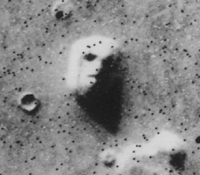
Back استسقاط Arabic Apofeniya Azerbaijani Апофения Bashkir Апафенія Byelorussian Апофения Bulgarian Apofènia Catalan Apofenie Czech Apophenia Danish Apophänie German Apofenia Spanish
This article needs additional citations for verification. (October 2023) |

Apophenia (/æpoʊˈfiːniə/) is the tendency to perceive meaningful connections between unrelated things.[2]
The term (German: Apophänie from the Greek verb: ἀποφαίνειν, romanized: apophaínein) was coined by psychiatrist Klaus Conrad in his 1958 publication on the beginning stages of schizophrenia.[3] He defined it as "unmotivated seeing of connections [accompanied by] a specific feeling of abnormal meaningfulness".[4][5] He described the early stages of delusional thought as self-referential over-interpretations of actual sensory perceptions, as opposed to hallucinations.[2][6]
Apophenia has also come to describe a human propensity to unreasonably seek definite patterns in random information, such as can occur in gambling.[5]
- ^ "PIA01141: Geologic 'Face on Mars' Formation". NASA. 2 April 1998. Retrieved 12 February 2011.
- ^ a b Carroll, Robert T. "apophenia". The Skeptic's Dictionary. Retrieved 17 July 2017.
- ^ Conrad, Klaus (1958). Die beginnende Schizophrenie. Versuch einer Gestaltanalyse des Wahns [The onset of schizophrenia: an attempt to form an analysis of delusion] (in German). Stuttgart: Georg Thieme Verlag. OCLC 14620263.
- ^ Mishara, Aaron (2010). "Klaus Conrad (1905–1961): Delusional Mood, Psychosis and Beginning Schizophrenia". Schizophr Bull. 36 (1): 9–13. doi:10.1093/schbul/sbp144. PMC 2800156. PMID 19965934.
- ^ a b Hubscher, Sandra L (4 November 2007). "Apophenia: Definition and Analysis". Digital Bits Skeptic. Digital Bits Network, LLC. Archived from the original on 21 January 2013.
- ^ Brugger, Peter. "From Haunted Brain to Haunted Science: A Cognitive Neuroscience View of Paranormal and Pseudoscientific Thought", Hauntings and Poltergeists: Multidisciplinary Perspectives, edited by J. Houran and R. Lange (North Carolina: McFarland & Company, Inc. Publishers, 2001)